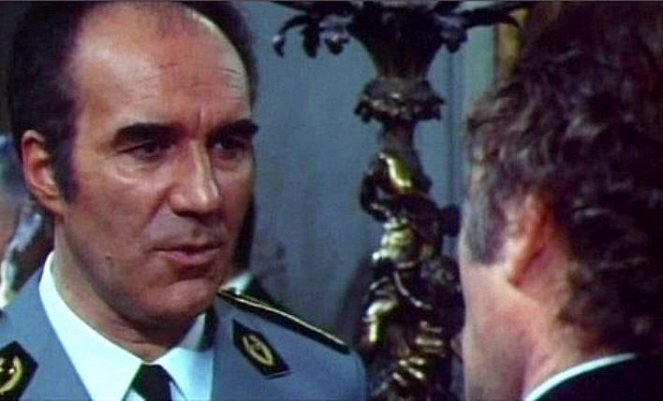Directed by:
Yves BoissetCinematography:
Ricardo AronovichComposer:
Ennio MorriconeCast:
Jean-Louis Trintignant, Michel Piccoli, Jean Seberg, Gian Maria Volonté, Michel Bouquet, Bruno Cremer, Philippe Noiret, François Périer, Roy Scheider (more)Plots(1)
L'Attentat is a political thriller based largely on a true story (the Ben Barka affair), which recounts how the French government and the American CIA connived to have a socialist in exile murdered before he could return to his homeland and start a revolution. Darien, a French journalist (Jean-Louis Tritignant), lures his friend Sadiel (Gian Maria Volonte) from his safe refuge in Geneva to appear on an American-made TV show. In doing so he is, perhaps unwittingly, setting him up for murder. Captured at the border by the French police, Sadiel is given over to a mysterious general from another country who tortures him to try to find out who his supporters are. (official distributor synopsis)
(more)Reviews (2)
Yves Boisset was such a rarity; a rebel of French cinema, a rebel from his very beginnings. Here too, in his second major film, he takes on the practices of French government circles and especially the police themselves, who don’t hesitate to kill even innocent people. No wonder the Bolsheviks were keen to show this film in cinemas, you know, a left-leaning protagonist and his socialist partner, both in danger of their lives from a Western government machine, it must have sold well to the commies. But the plot is too trivial for the two-hour runtime, predictable in places, Morricone's music surprisingly bland and the elite cast, assembled from across the film industry of Western Europe, doesn’t pull it off. But as always I was delighted by Trintignant and impressed by Volonté with his – unusual for him – subdued acting.
()
In the opening dynamically shot scene, enraged demonstrators clash uncompromisingly with the police unit. From the filmmakers' perspective, stone-throwing protesters equipped with Molotov cocktails represent the legitimate indignation of the proletariat and the working intelligentsia, while the police are seen as a brutal force meant to suppress the masses and ensure the domination of imperialists and multinational capital. From the first moments, the film leaves no one in doubt that it is a product of its time, when - mainly in Italy and France - the majority of the cultural front stood in radical left positions. Communist parties were still in fashion and had a large membership base. True, the reputation of the Soviet Union suffered greatly during the invasion of Czechoslovakia, but the fallen idol was replaced by the worship of the Chinese Cultural Revolution, which evidently did not disturb Western European intellectuals despite the millions of dead. The turn of the 60s and 70s marked the peak of Maoism's influence in the environment of Western European universities. Political considerations rarely play a decisive role for me when evaluating films, but I must include them when considering this film. It is pointless to hide that, within the framework of the Cold War, the frustration of political elites over the collapse of their empires, as well as the effort to maintain positions in former colonies, sometimes led to the use of the dirty practices depicted in the film. However, the political reality of Eastern Bloc countries was significantly worse, with practices that were no less dirty and foreign policy that was no less cynical. The Assassination perfectly fit into the propaganda that the Communist Party was feeding to its followers, and it would be interesting to count how many times this film was aired on television each year. In any case, it was one of the most frequently appearing foreign titles in Czech broadcasts. Particularly disgusting is the portrayal of Western journalists, who are practically without exception depicted as corrupt lackeys of secret services and powerful capitalist groups. In reality, there was no independent press or other media in the Eastern Bloc, and serving the political power was obvious and actually the only option. The film's strengths undoubtedly lie in the performances of the actors and the presence of great cinema stars, whether it was Trintignant, Seberg, or Volonté, but this time I am unable to appreciate their efforts. Overall impression: 40%.
()

